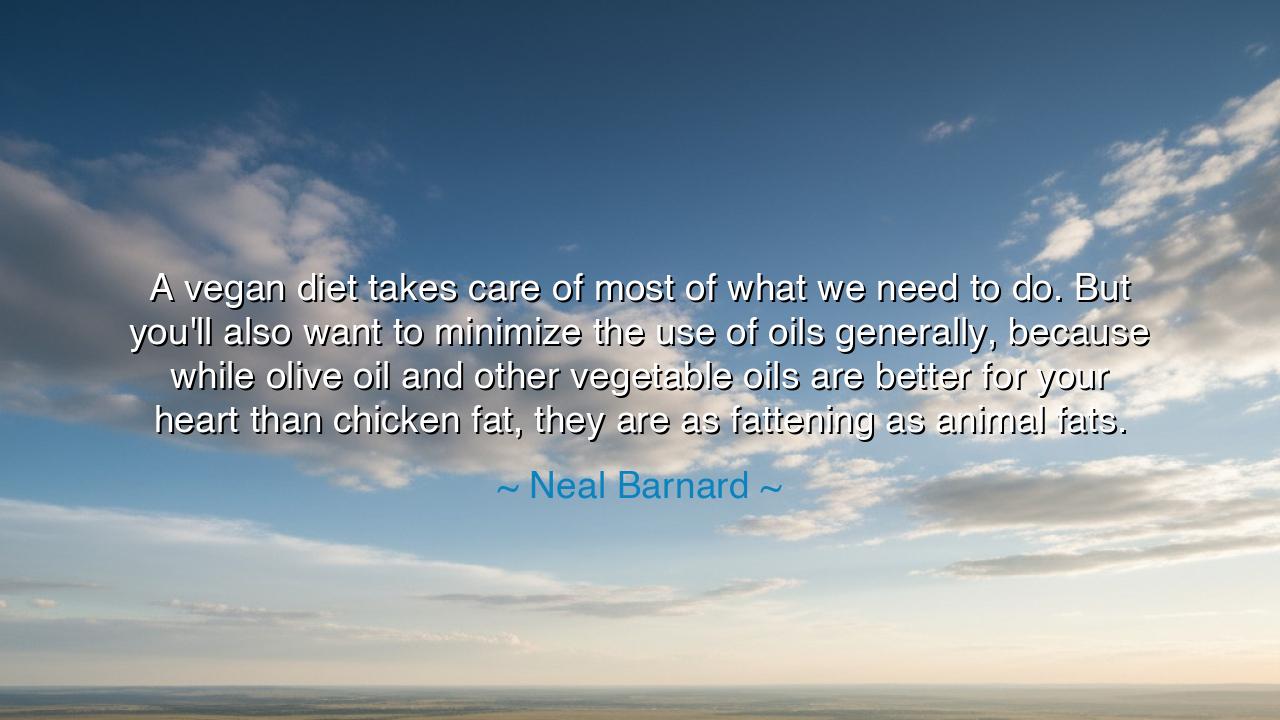
A vegan diet takes care of most of what we need to do. But you'll
A vegan diet takes care of most of what we need to do. But you'll also want to minimize the use of oils generally, because while olive oil and other vegetable oils are better for your heart than chicken fat, they are as fattening as animal fats.






The words of Neal Barnard are spoken not as a mere physician of the body, but as a healer of the spirit. When he declares, “A vegan diet takes care of most of what we need to do. But you'll also want to minimize the use of oils generally, because while olive oil and other vegetable oils are better for your heart than chicken fat, they are as fattening as animal fats,” he is not offering a rule of diet alone — he is revealing an ancient truth: that all excess, no matter how noble its source, becomes the seed of decline. His words rise from the soil of both modern science and timeless wisdom, reminding us that health is not achieved through substitution, but through balance — through harmony between restraint and nourishment.
From the dawn of civilization, the wise have taught that the path of moderation is the path of strength. The Buddha, after years of fasting and indulgence, found enlightenment only when he walked the Middle Way. So too does Barnard’s counsel reflect this same eternal law. He praises the vegan diet — a way of eating that honors life and spares cruelty — yet he cautions against worshiping it as a perfect shield. For even in compassion, one may find temptation; even in purity, there lies the danger of excess. Oil, though drawn from plants and not flesh, carries within it the same power to burden the body and dull the spirit when taken without measure.
Let us look to the story of ancient Rome, where the people once lived on grains, fruits, and humble fare. In their simplicity, they built empires, conquered oceans, and carved cities that defied time. But when luxury entered their kitchens and olive oil flowed like rivers, the vigor of their youth waned. Their soldiers grew soft, their appetites fierce. What was once a symbol of light — oil for lamps and offering — became the mark of decadence. Thus history itself bears witness to Barnard’s words: that abundance, ungoverned by wisdom, leads to decline.
The heart of his teaching lies not in prohibition, but in awareness. To live well, we must see food not as comfort or fashion, but as fuel for life’s purpose. The vegan diet, when practiced with mindfulness, cleanses the blood and clears the mind. But to pour oil upon every dish, even of plants, is to drown the vitality one seeks. Just as a lamp burns bright only when its oil is measured, so too does the human flame thrive when its fuel is chosen with care. The wise eater does not live to eat — he eats to live, to serve his days with strength and clarity.
There is a quiet nobility in such discipline. In the modern world, where gluttony wears the mask of health, restraint has become a rebellion. Barnard’s teaching challenges not only our habits but our hearts. He reminds us that even what is “healthy” can deceive us if we do not listen to the body’s whispers — the heaviness after the meal, the dullness of energy, the slow surrender of will. True wellness demands conscious simplicity: to strip away what is unnecessary, to live close to the earth, and to honor the body as one would a sacred vessel.
One may recall the monks of Mount Hiei, who ran a thousand marathons over a thousand days, sustained only by grains, vegetables, and water. Their strength did not come from excess but from purity — from knowing that self-control is the root of all power. So too does Barnard’s wisdom call us to this inner discipline: to recognize that every bite is a choice between indulgence and mastery, between fleeting pleasure and lasting vitality.
And so, dear listener, let his words be a mirror to your own life. Examine not only what you eat, but how you eat — not only the food, but the intention behind it. Choose the plant-based path, for it nourishes both body and conscience. But walk it with mindfulness, trimming away the oils of excess, that your light may burn steady and clear. For the body is the temple, and the flame within it must not be smothered by indulgence disguised as virtue. Thus, in balance lies liberation — and in simplicity, the true feast of life.






AAdministratorAdministrator
Welcome, honored guests. Please leave a comment, we will respond soon